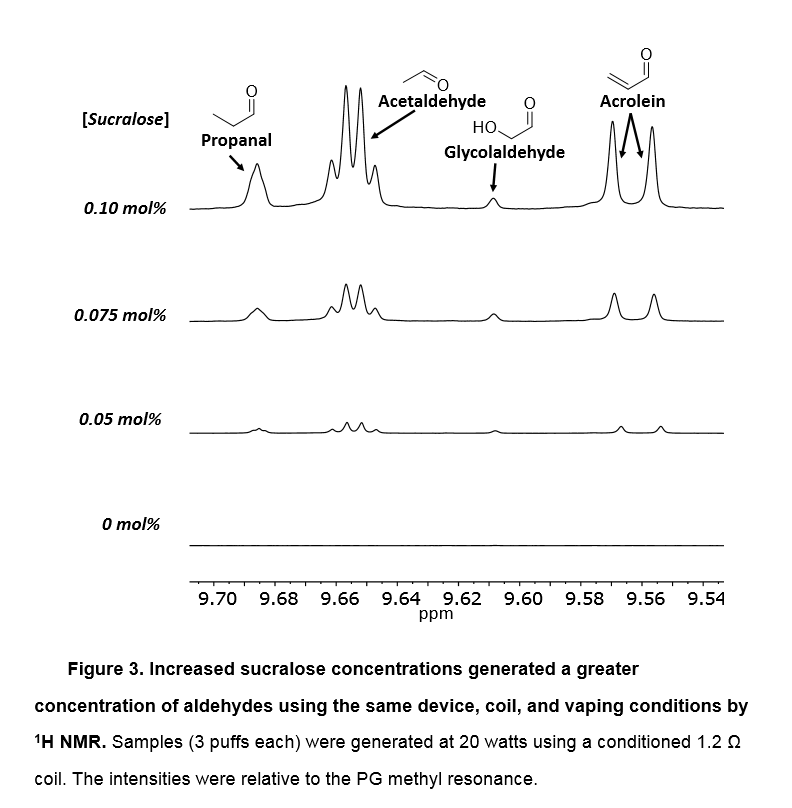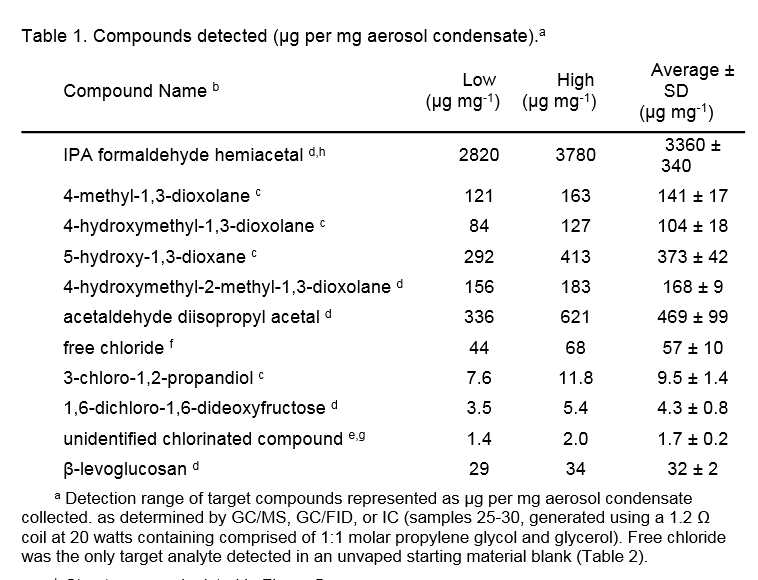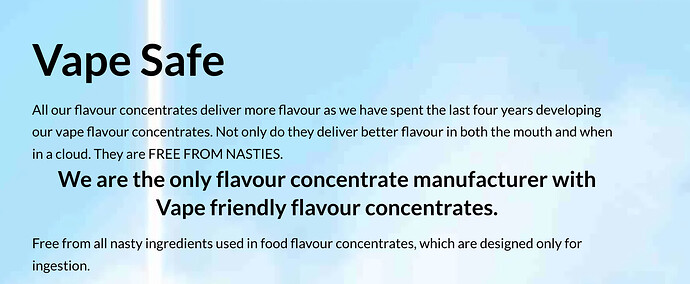It’s ages that we know about it, ages that people talk about the fact the Sucralose it’s not exactly healthy even if used for food…:
https://www.tandfonline.com/doi/abs/…nalCode=yjoh20 and/or https://draxe.com/artificial-sweeteners/
A study on the subject, dedicated to vaping hasn’t been done, here we go with the link to the complete study that’s been published a couple of weeks ago:
https://sci-hub.tw/10.1021/acs.chemrestox.9b00047
As more of those studies like this are published more knowledge we have and more choices we have on what to do with it, ( A choice that smokers don’t have…) for us is a good thing we can improve and make our vaping healthier.
Let’s cut a long story short and let’s briefly have a look at it with my summary below
They practically say that increasing the sucralose percentages on a 1.2 Ohm, 20W e-cig test device (have a look at the full study for details) at different percentages sucralose degrades and starts forming aldehydes; Propanal, acetaldehyde, glycolaldehyde, and acrolein:
The diagram shows that at 0 percentage there are no aldehydes formation, see below the exact percentages of the formation when increased to 0.10mol%:
There are, a few consideration that have to be made about this study, but I’ll have a look at those later.
So what’s the deal?
What I’m worried about it’s not that this study can be right or wrong, but the fact that the medias will jump on it and use it against us… Let’s hope for the best.
The other thing I would certainly be worried about is the “Off the Shelf” e-juices, unfortunately all DIY’ers know that manufacturer have happily used sucralose in their mixes without caring if healthy or not, but at their selling figures, the best thing to do is ask, or check the label, if the e-juice we (they… not me, it’s years I don’t) are buying has sucralose and at what percentage, I hardly think a seller/manufacturer will ever do that and I don’t know of many… that do (well Charlie Noble does)
We all know that sugars are not exactly healthy for vaping and DIY’ers steered away from Sucralose ages ago (At least a couple of years we talk about this thing) and changed it to alternatives like Stevia or none at all, there are quite a few ways to avoid the use of Sucralose, we know them… (if you don’t… use “Search”  )
)
I don’t want to create an alarm but give the correct information (or what I think it’s a correct information) so we can decide by ourselves.
Flavour manufacturer usually dont 'use sucralose in their flavours, let’s have a look below at TFA’s flavour usual specsheet link:
https://shop.perfumersapprentice.com/specsheetlist.aspx
If you “list” the flavour and look at the compounds, you’ll rarely see sucralose to start with (you won’t see Strawberry and the like, probably externally sourced) where do we see Sucralose? Quite clearly in their Sweetener:
https://shop.perfumersapprentice.com/componentlist.aspx?sku_search=342300
At what percentage??? <5%!! Let’s go back up and look where that 5%l (0.05mol%) stands at, even vaping a straight flavour (that none of us would do!) the aldehydes formation would be extremely low!
But (I know that I will sound like Monty Python) if that <5% is in the flavour itself, what are we going to do with it?? Vaping it straight? No we won’t! Are we diluting it? Aaaand, if we dilute the flavour, at what percentage will our final percentage be?? Veeery low!!..Therefore??? She’s a duck!
I know it sounds silly, but clearly it’ll be very low, so the sucralose at that percentage wouldn’t degrade at whatever temperature (unless we are stupid and burn the wick, but in that case we’ll have a nice draw of Acrolein…)
So this is one of the things that from my point of view this study hasn’t even thought about, scientific innit??
But even flavour manufacturer (some of them…) are playing clever…
E.g. my friends at Capella, with their Super Sweet which apparently is made of : Sucralose, Citric Acid, Sodium Citrate, Potassium Sorbate, Sodium Benzoate… If you didn’t now you know… your choice…
But there are people that really care about us, and they make flavours dedicated to vaping not taken only from the food market…
One of them is definitely Flavorah, they made a sweetener that doesn’t contain either Maltodextrin, Fructose or Sucralose, it’s clearly a trade secret and we understand this, but at least is a vape dedicated flavour.
I know that there are quite a few things we could argue about this study, if correct or not, things like adding sodium bicarbonate, and things like that, but the fact is that we (mixers) usually stay away from that stuff!
Some use it but in the range of 0.25% 0.5% or make their own usually diluted at <2% not even 5%.
Unfortunately not good news for non-mixers, but it’s what makes us different from smokers, we have the knowledge and we can make a choice… they don’t or can’t!



